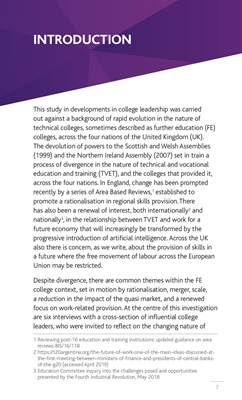
7
This study in developments in college leadership was carried
out against a background of rapid evolution in the nature of
technical colleges, sometimes described as further education (FE)
colleges, across the four nations of the United Kingdom (UK).
The devolution of powers to the Scottish and Welsh Assemblies
(1999) and the Northern Ireland Assembly (2007) set in train a
process of divergence in the nature of technical and vocational
education and training (TVET), and the colleges that provided it,
across the four nations. In England, change has been prompted
recently by a series of Area Based Reviews,1 established to
promote a rationalisation in regional skills provision. There
has also been a renewal of interest, both internationally2 and
nationally3, in the relationship between TVET and work for a
future economy that will increasingly be transformed by the
progressive introduction of artificial intelligence. Across the UK
also there is concern, as we write, about the provision of skills in
a future where the free movement of labour across the European
Union may be restricted.
Despite divergence, there are common themes within the FE
college context, set in motion by rationalisation, merger, scale,
a reduction in the impact of the quasi market, and a renewed
focus on work-related provision. At the centre of this investigation
are six interviews with a cross-section of influential college
leaders, who were invited to reflect on the changing nature of
1 Reviewing post-16 education and training institutions: updated guidance on area
reviews BIS/16/118
2 https://t20argentina.org/the-future-of-work-one-of-the-main-ideas-discussed-atthe-first-meeting-between-ministers-of-finance-and-presidents-of-central-banksof-the-g20
(accessed April 2019)
3 Education Committee inquiry into the challenges posed and opportunities
presented by the Fourth Industrial Revolution, May 2018
INTRODUCTION